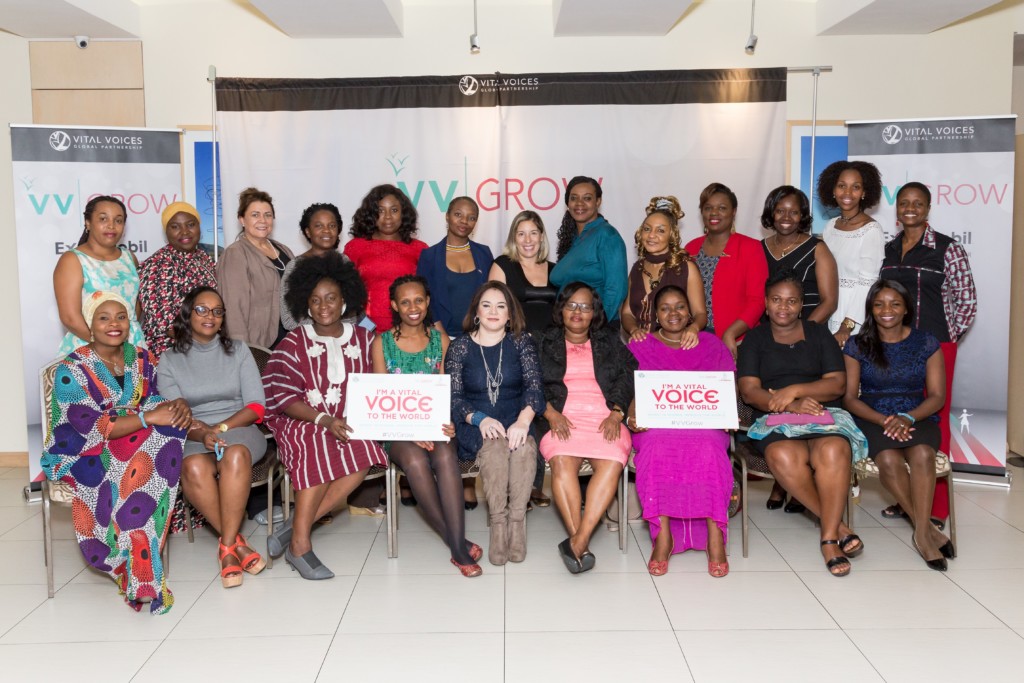Congratulations, Graduates!

On June 7th, Vital Voices celebrated the 2016-2017 VV GROW Fellowship graduation. Held over one year, 65 women business owners from 34 countries across Latin America and the Caribbean, the Middle East and North Africa and Sub-Saharan Africa participated in the only accelerator of its kind for women owners of small and medium sized businesses. Joined by Vital Voices staff, Global Founding Partner the ExxonMobil Foundation, Platinum Sponsor FedEx, and VV GROW alumna, fellows reflected on their journey through the program as they looked forward to the future. As a 2016-2017 fellow said, “This has been one of the best experiences in my life, both from the business and personal point of view. Extremely fulfilling and enlightening for my business, powerful in terms of the amazing networks created, humbling by allowing me to see, once again, that women are such special beings, having the strength and tenacity to build their own businesses while caring for their families and their communities as well.”
By investing in women’s economic empowerment and supporting women business owners, Vital Voices contributes to closing the economic empowerment gender gap, disrupting practices and social norms that unequally limit the role of women and create harmful costs to societies, and encouraging inclusive economic growth and job creation. Small and medium enterprises (SMEs), and women owned SMEs in particular, are critical to filling the global jobs gap, projected to reach 600 million by 2020. In low to middle income countries, SMEs create 70% of net job growth and women entrepreneurs are 31% more likely to hire more workers than their male counterparts.
As the UN noted in its report, Leave No One Behind[1], if we do not address the pervasive discrimination against women across the world, including inequalities in economic opportunity, we will fail to meet many essential development goals. From the Sustainable Development Goals for poverty reduction and human development to improving health and educational outcomes, women’s economic empowerment is a linchpin to improving lives. Reducing gender inequality is also critical to maintaining stability, as research has shown that the higher levels of gender inequality a country experiences, the greater the likelihood that country will experience internal conflict and insecurity[2].
Through the fellowship, Vital Voices provides women business owners customized business skills training, technical assistance, leadership development and access to networks. Two years after the completion of the fellowship, results from the 2013-2014 cohort have shown an average increase of 42% in sales and 40% of fellows increased employees, with 100% making changes to business operations to improve productivity. Among alumna, 68% of fellows used one connection made through Vital Voices to grow their business, of which 16% accessed new buyers in domestic markets and 11% accessed new buyers in international markets. They have mentored 1,899 people, trained 7,673 people outside their business, and reached 22,544 individuals in presentations and speeches on women’s empowerment.
Increasingly, organizations in all sectors widely champion that supporting women’s economic empowerment is not only the right thing to do, but the smart economic decision. In 2016 alone, Vital Voices was proud to work with 81 such partners including business women’s associations in over 15 countries, Airbnb, Akin Gump, Brandtone, Global Entrepreneurship Network, Kiva, Impact Scorecard, UN Women, and the William Davidson Institute at the University of Michigan.
To learn more and read the stories and experiences of five women business owners with the fellowship, click here. For the latest news and updates on the program, please follow #VVGROW and @malini_patel!
Authored by:
Malini Patel
Vital Voices, Vice President of Economic Empowerment and Entrepreneurship
[1] Leave No One Behind: Taking Action for Transformational Change on Women’s Economic Empowerment.” UNHLP, 2017
[2] M Caprioli, ‘Primed for Violence: The role of gender inequality in predicting internal conflict’, International Studies Quarterly (2005) 49, pp. 161–178